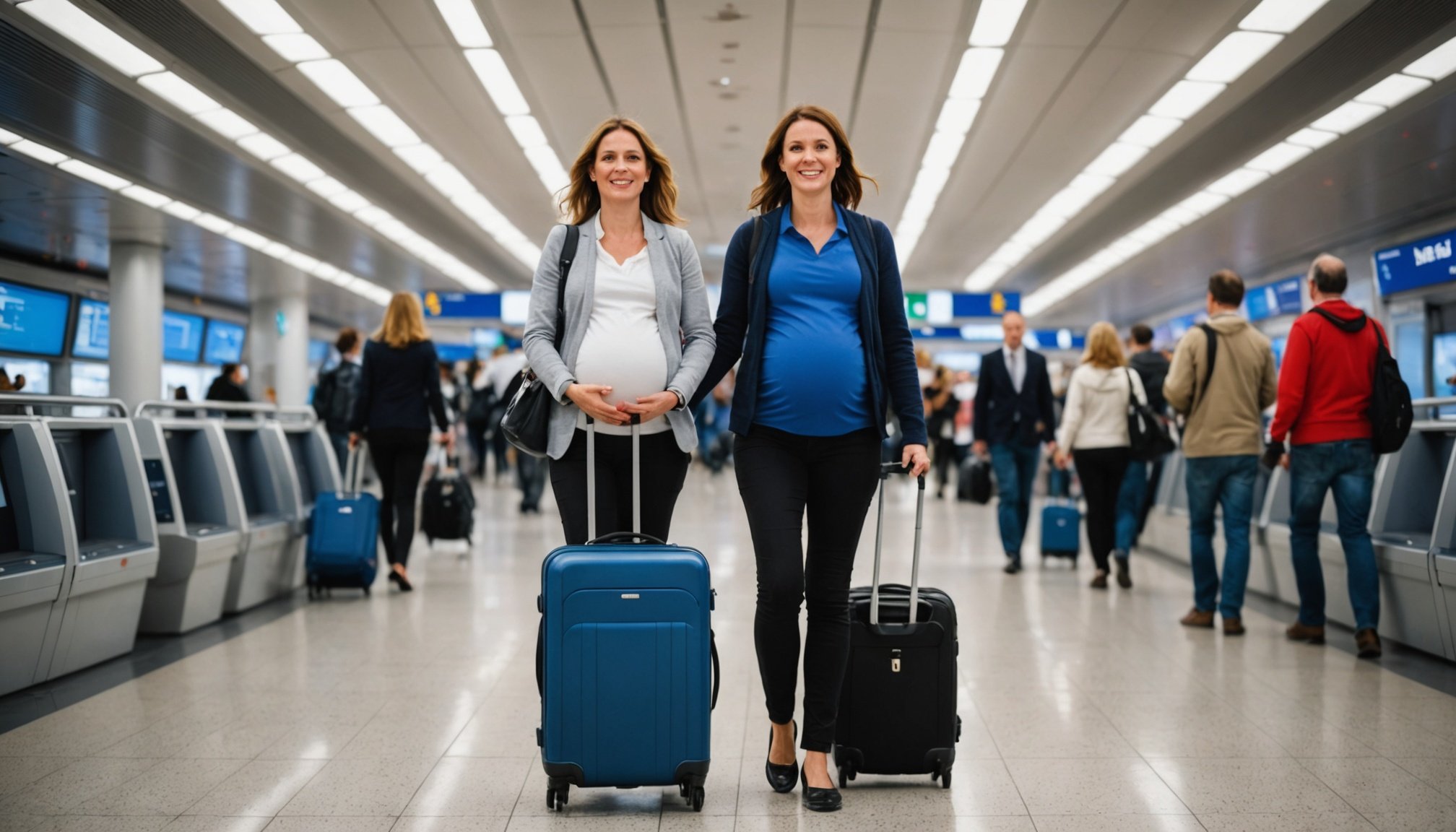Overview of Air Travel Regulations for Pregnant Travelers
Navigating air travel regulations as pregnant travelers can be perplexing, especially with various UK airlines adopting different guidelines. The key is to understand the common elements across airlines, as well as the unique rules each carrier might enforce, emphasizing the importance of examining specific airline policies thoroughly.
UK airlines typically allow pregnant women to fly until around the 36th week, though each airline establishes its own cut-off point more precisely. Early pregnancies generally pose fewer restrictions, but as pregnancy progresses, airlines may demand more documentation, such as a medical certificate clarifying the traveler’s fitness to fly.
Also to discover : Top Cooling Strategies for Expecting Mothers to Beat the UK Heatwave
Understanding and adhering to these regulations is crucial. Missteps in preparing and carrying the necessary documents might result in the refusal to board. Hence, it’s paramount for expectant mothers to consult both their chosen airline’s policy and their healthcare provider to ensure compliance and safety.
Different stages of pregnancy bring distinct challenges to air travel, necessitating even more careful planning. Pregnant travelers should consider factors like potential health risks related to extended sitting, scheduling flights to manage fatigue better, and choosing airlines that offer comprehensive support during the flight. Keeping these safe travel considerations in mind helps ensure a smooth journey.
Also to discover : Exploring Recent UK Research: How Prenatal Classical Music Exposure Influences Cognitive Development
Health Considerations for Pregnant Travelers
When engaging in air travel during pregnancy, it is crucial to address common health considerations to ensure a safe journey. Pregnant travelers should be aware of potential discomforts, such as swollen feet and back pain, due to lengthy flights and limited mobility. Air travel safety can be enhanced by consulting healthcare providers before flying to discuss any existing medical conditions or pregnancy-related risks.
Medical check-ups before a flight can provide reassurance about your health condition and offer advice on managing symptoms that might affect travel comfort. It’s recommended to seek medical clearance, particularly if approaching later stages of pregnancy or if complications exist.
Managing discomfort and fatigue requires strategic planning. Seat selection, such as an aisle seat, aids in frequent walks to improve circulation. Staying hydrated and wearing comfortable clothing can also alleviate some in-flight discomforts. Additionally, practicing light exercises and stretches during the flight can be beneficial.
Expectant mothers should adhere to airline guidelines, tailor their travel plans to accommodate their health needs, and leverage airline support services for optimal comfort. Understanding and addressing these health considerations significantly contribute to a positive travel experience, ensuring mothers and their unborn children remain safe throughout the journey.
Required Documentation for Pregnant Travelers
Navigating the necessary required documentation when flying during pregnancy ensures a seamless travel experience. Airlines often require a medical clearance letter from a healthcare provider, especially for women in later pregnancy stages. This letter verifies that the traveler is fit to fly and can be subject to specific airline guidelines, which vary according to gestational week and any existing complications.
It’s crucial for pregnant travelers to secure all necessary documents well in advance of their departure. This preparation includes understanding potential requirements for additional documentation if complications are present. Airlines might request further evidence of suitability to fly if issues like gestational diabetes, high blood pressure, or history of premature labor exist.
Your healthcare provider can also offer important insights and assurances about your travel readiness. It’s advisable to discuss travel plans comprehensively with them, ensuring all necessary health checks are conducted.
Ensuring all travel necessities and documentation are in order will prevent unnecessary stress and enable a focus on comfort and safety. Before traveling, check the air travel regulations thoroughly, keeping all documents easily accessible for check-in and boarding. Planning ahead with these precautions reassures both the traveler and airline staff of a well-prepared journey.
Airline-Specific Guidelines for Pregnant Travelers
Air travel regulations for pregnant women vary significantly across UK airlines, making it vital to understand each airline’s policies. These guidelines influence aspects like flight eligibility and required documentation, directly affecting pregnant travelers.
Major UK Airlines
Most UK airlines permit pregnant travelers to fly until around the 36th week, but specifics can differ. British Airways, for instance, allows travel until the end of the 36th week with medical clearance, while easyJet has slightly different requirements. It’s crucial to check each airline’s cut-off week and documentation needs.
Unique Policies and Recommendations
Some airlines implement unique policies for pregnant travelers. Ryanair, for example, might necessitate additional medical forms if complications exist. These variations emphasize the importance of directly consulting airline guidelines well in advance of traveling.
Comparison of Airline Regulations
To navigate these differences, create a checklist when comparing airline policies. Consider factors like flight duration limits and any specific pregnancy-related support services offered. By understanding these UK travel guidelines, pregnant travelers ensure compliance and focus on a smoother journey. Comparing airline-specific requirements and services helps travelers choose the best option tailored to their unique needs and circumstances.
Travel Tips for Pregnant Flyers
Travelling while pregnant necessitates careful preparation to ensure a comfortable and safe journey. Thoughtful packing is crucial. Consider packing an essential travel kit with items like snacks, water, a neck pillow, and any necessary medications. Comfortable clothing and shoes are also key to reducing discomfort during the flight.
When selecting a flight, timing matters. Opt for shorter flights or routes with manageable layovers to avoid unnecessary fatigue. Choosing flight times that align with your energy levels, such as morning flights if you feel more energetic earlier in the day, can also enhance comfort.
Seat selection plays a significant role in managing comfort. An aisle seat is advantageous, allowing you easy access to walk around and stretch, thus promoting circulation. This simple step can significantly alleviate swelling and discomfort.
Strategically planning your journey with these travel tips will help maintain well-being while flying. Be proactive with flight preparation, which includes engaging with airline staff for any special accommodations you may require. Remember, understanding and communicating your specific needs with the airline ensures a seamless experience. With the right approach, pregnant travelers can navigate the skies with confidence and ease.
Safety Measures and Support Services for Pregnant Travelers
Pregnant passengers should be aware of the various safety measures and support services available when flying. Airlines recognise the unique needs of expecting mothers and offer specific accommodations to ensure a comfortable and secure journey.
In-Flight Safety Measures
Airlines implement several in-flight safety measures for pregnant women, such as providing seatbelt extenders to enhance comfort and ensure safety during turbulence. Cabin crew are trained in first aid, offering reassurance to those worried about medical issues arising mid-flight. Availability of medical kits and emergency protocols further solidifies safety.
Airport and Flight Support Services
Beyond the flight, airports offer support services tailored to pregnant travelers. Priority boarding processes minimise standing time, and many airports feature lounges with reclining seats for rest. Wheelchair services and assistance with baggage are also commonly provided, easing the travel process.
Customised Airline Accommodations
Pregnant travelers should inform airlines of their condition in advance. This ensures tailored accommodations are available, such as meals catering to pregnancy dietary needs and proximity to restrooms. Airlines aim to support pregnant women, making resources and preparations readily accessible to address any travel concerns efficiently.
Understanding these measures helps anticipate and mitigate travel challenges, allowing pregnant guests to fly with greater confidence and peace of mind.
Resources and Support for Pregnant Travelers
Engaging in air travel while pregnant can be daunting, but a plethora of resources and support is available to ease the journey. Expectant mothers can access online resources providing comprehensive guidelines on traveling during pregnancy. Websites such as BabyCentre UK offer detailed advice about accommodating changes during travel, ensuring a well-prepared trip.
Effective communication is key. Most UK airlines offer designated customer service contacts for pregnant travelers. Reaching out to these services before departure allows travelers to receive tailored advice and information about specific requirements.
Being a part of community support groups and forums is also beneficial. These platforms enable the sharing of experiences and practical tips among travelers facing similar circumstances. Hearing others’ stories can provide reassurance and enrich decision-making processes.
Understanding where to find appropriate travel support enhances preparation and confidence. Bookmark useful websites and contact airline services in advance. Proactively connecting with helpful resources ensures that travelers are informed and reassured throughout their journey. Whether through interactive forums or direct airline communication, knowing where to seek help empowers pregnant women to navigate air travel with peace of mind.









